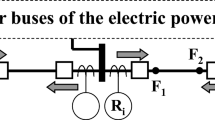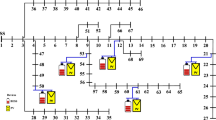Abstract
Standard economic dispatch (ED) of power generating units traditionally considers only real power generation and real power losses. Real power losses are often treated using the approximate B-loss coefficients, which are pre-calculated for a power system using load flow solution for certain base-case loading conditions. These coefficients do not assure accuracy for large deviations from the base-case loading conditions, as they are derived with few assumptions that assure an adequate accuracy for small deviations from the base-case conditions. Reactive power loss is unlike the real part as it does not have straightforward closed-form expressions for ED involving reactive power concerns. Inspired by old Kron’s loss formula derivations, this paper presents new original closed-form expressions for active and reactive power loss formulas, which are derived mainly to improve the deficiencies of the traditional ED formulations that use less accurate real power loss expressions and ignore reactive power demands and losses. The obtained coefficients are tested on four different-size test systems, and the results are compared with those obtained from solutions of both the load flow and B-coefficients for wide deviations from the base-case operating conditions. Then, the paper presents the mathematical model of the combined active-reactive complex power ED (CPED) including complex power losses using the new derived improved complex power loss coefficients that guarantee more accurate real power losses while considering reactive power concerns. The proposed CPED scheme using the new coefficients is then tested on the four test systems and compared for five costing methods of reactive power. Results and comparisons presented in this paper will show that the active and reactive power loss formulas can achieve more realistic results and accuracy for different system sizes and operating conditions, in addition to showing that reactive power consideration can significantly change outcomes of the standard ED.







Similar content being viewed by others
References
Grainger, J.J., Stevenson, W.D., Chang, G.W.: Power System Analysis. McGraw-Hill, New York (2015)
Saadat, H.: Power System Analysis. McGraw-Hill, New York (2011)
Shahidehpour, M., Alomoush, M.: Restructured Electrical Power Systems: Operation, Trading and Volatility. Marcel Dekker Inc., New York (2001)
Baldick, R.: Reactive issues: reactive power in restructured markets. IEEE Power Energy Mag. 2(6), 14–17 (2004)
Tabatabaei, N.M., Aghbolaghi, A.J., Bizon, N., Blaabjerg, F. (eds.): Reactive Power Control in AC Power Systems: Fundamentals and Current Issues. Springer, Cham (2017)
Bhattacharya, K., Zhong, J.: Reactive power as ancillary service. IEEE Trans. Power Syst. 16(2), 294–300 (2001)
Zhong, J., Bhattacharya, K.: Toward a competitive market for reactive power. IEEE Trans. Power Syst. 17(4), 1206–1215 (2002)
Zhong, J.: A pricing mechanism for network reactive power devices in competitive market. In Proceedings of IEEE Power India Conference, 10–12 April 2006, New Delhi, India
Chapman, S.J.: Electric Machinery Fundamentals. McGraw-Hill, New York (1985)
Weedy, B.M., Cory, B.J.: Electric Power Systems. Wiley, New Jersey (1998)
Crawley, T.L.: Validation of generator reactive capability. In: Proceedings of IEEE Power Eng. Soc General Meeting, Toronto, Canada, July 13–17 (2003)
Nilsson, N.E., Mercurio, J.: Synchronous generator capability curve testing and evaluation. IEEE Trans. Power Deliv. 9(1), 414–424 (1994)
Chowdhury, E.H., Rahrnan, S.: A review of recent advances in economic dispatch. IEEE Trans. Power Syst. 5(4), 1248–1259 (1990)
Alomoush, M.I., Oweis, Z.B.: Environmental-economic dispatch using stochastic fractal search algorithm. Int. Trans. Electr. Energy Syst. 28, 5 (2018). https://doi.org/10.1002/etep.2530
Lee, K.Y., Park, Y.M., Ortiz, J.L.: Optimal real and reactive power dispatch. Electr. Power Syst. Res. 7, 201–212 (1984)
Lee, Y., Park, Y.M., Ortiz, J.L.: A united approach to optimal real and reactive power dispatch. IEEE Trans. Power Appar. Syst. 104(5), 1147–1153 (1985)
Chebbo, A.M., Irving, M.R.: Combined active and reactive dispatch Part 1: problem formulation and solution algorithm. IEE Proc. Gener. Transm. Distrib. 142(4), 393–400 (1995)
Lamont, J.W., Fu, J.: Cost analysis of reactive power support. IEEE Trans. Power Syst. 14(3), 890–898 (1999)
Parida, S.K., Singh, S.N., Srivastava, S.C.: Reactive power cost allocation by using a value-based approach. IET Gener. Transm. Distrib. 3(9), 872–884 (2009)
Kumar, R., Kumar, A.: Real and reactive power price of generators to load in pool based electricity market model. In: Proceedings of 2015 International Conference on Energy Economics and Environment (ICEEE), 27–28 March, Noida, India (2015)
Hasanpour, S., Ghazi, R., Javidi, M.H.: A new approach for cost allocation and reactive power pricing in a deregulated environment. Electr. Eng. 91(1), 27–34 (2009)
Lin, X.J., Yu, C.W., David, A.K., Chung, C.Y., Wu, H., Xu, N.: A novel market-based reactive power management scheme. Electr. Power Energy Syst. 28(2), 127–132 (2006)
Singh, K., Padhy, N.P., Sharma, J.D.: Social welfare maximization considering reactive power and congestion management in the deregulated environment. Electr. Power Compon. Syst. 38(1), 50–71 (2010)
Xie, K., Song, Y.H., Zhang, D., Nakanishi, Y., Nakazawa, C.: Calculation and decomposition of spot price using interior point nonlinear optimization methods. Electr. Power Energy Syst. 26(5), 379–388 (2004)
Safari, A., Salyani, P., Hajiloo, M.: Reactive power pricing in power markets: a comprehensive review. Int. J. Ambient Energy (2018). https://doi.org/10.1080/01430750.2018.1517675
Malakar, T., Rajan, A., Jeevan, K., Dhar, P.: A day ahead price sensitive reactive power dispatch with minimum control. Electr. Power Energy Syst. 81, 427–443 (2016)
Yang, Z., Zhong, H., Xia, Q., Kang, C.: A novel network model for optimal power flow with reactive power and network losses. Electr. Power Syst. Res. 144, 63–71 (2017)
Dahab, M.: Reactive power locational marginal pricing. In: 2018 International Conference on Computer, Control, Electrical, and Electronics Engineering (ICCCEEE), 12–14 August, Khartoum, Sudan (2018)
Zein, H., Raharjo, J., Mulyadi, A.D.: Optimal complex power production cost in the electric power market. In: 2018 International Conference on Sustainable Energy Engineering and Application (ICSEEA), 1–2 Nov, Tangerang, Indonesia (2018)
Hill, E.F., Stevenson Jr., W.D.: A new method of determining loss coefficients. IEEE Trans. Power Appar. Syst. 87(7), 1548–1553 (1968)
Early, E.D., Smith, G.L., Watson, R.E.: A general transmission loss equation. AIEE Trans. Part III: Power Appar. Syst. 74(3), 510–520 (1955)
Early, E.D., Smith, G.L., Watson, R.E.: A new method for determining constants of the—general transmission loss equation. AIEE Trans. Part III: Power Appar. Syst. 74(3), 1417–1423 (1955)
Kirchmayer, L.K., Stagg, G.W.: Analysis of total and incremental losses in transmission systems. AIEE Trans. Part. II 70, 1197–1205 (1951)
Harder, E.L., Ferguson, R.W., Jacobs, W.E., Harker, D.C.: Loss evaluation-part II. Current- and power-form loss formulas. AIEE Trans. Part. III-A 73, 716–731 (1954)
Kron, G.: Tensorial analysis of integrated transmission systems-part I. The six basic reference frames. AIEE Trans. Part. II 70, 1239–1248 (1951)
George, E.E.: A new method of making transmission-loss formulas by means of eigenvalues and modal matrices. AIEE Trans. Part III Power Appar. Syst. 79(3), 287–296 (1960)
Jiang, A., Ertem, S.: Polynomial loss models for economic dispatch and error estimation. IEEE Trans. Power Syst. 10(3), 1546–1552 (1995)
Ng, W.Y.: Generalized generation distribution factors for power system security evaluations. IEEE Trans. Power Appar. Syst. 100, 1001–1005 (1985)
Huang, W.-T., Yao, K.-C., Chen, M.-K., Wang, F.-Y., Zhu, C.-H., Chang, Y.-R., Lee, Y.-D., Ho, Y.-H.: Derivation and application of a new transmission loss formula for power system economic dispatch. Energies 11(2), 1–19 (2018). https://doi.org/10.3390/en11020417
Zimmerman, R.D., Murillo-S´anchez, C.E., Gan, D.: MATPOWER, Power Systems Engineering Research Center (PSERC), Cornell University (2018) [Online]. http://pserc.cornell.edu/matpower. Accessed 7 Feb 2019
Author information
Authors and Affiliations
Corresponding author
Additional information
Publisher's Note
Springer Nature remains neutral with regard to jurisdictional claims in published maps and institutional affiliations.
Rights and permissions
About this article
Cite this article
Alomoush, M.I. Complex power economic dispatch with improved loss coefficients. Energy Syst 12, 1005–1046 (2021). https://doi.org/10.1007/s12667-019-00370-y
Received:
Accepted:
Published:
Issue Date:
DOI: https://doi.org/10.1007/s12667-019-00370-y




